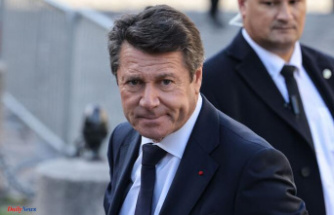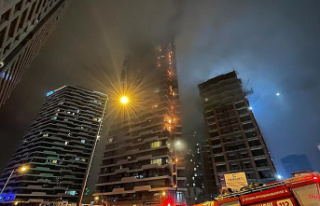At the party conference in Beijing, head of state and party leader Xi is preparing the country for difficult times. The next five years are crucial. He warns Taiwan: China is striving for peaceful "unification," "but we will never commit ourselves to giving up the use of force."
At the start of the Communist Party Congress in Beijing, China's head of state and party leader Xi Jinping warned of "potential dangers" and difficult times and directed a threat at Taiwan. In a keynote address to around 2,300 delegates in the Great Hall of the People in Beijing, the President called for "preparing for the worst cases". "Therefore prepare yourself and be prepared to withstand strong winds, heavy seas and even dangerous storms."
In his speech, Xi threatened Taiwan with military action. China is striving for peaceful "unification," "but we will never commit to abandoning the use of force," the president said. The Chinese leadership will keep the "option to take all necessary measures". These were aimed at foreign interference and a "small number" of pro-independence forces, "not the compatriots in Taiwan," Xi pointed out. "The full reunification of the fatherland must be achieved and can be achieved."
China will wage an "important fight against separatism and interference" in Taiwan, Xi said. Beijing sees the democratically governed island state as a breakaway territory that should be reunited with China, if necessary by force. The Russian war of aggression against Ukraine has raised fears that Beijing could use a similar approach in its dealings with Taiwan. Xi praised China's Hong Kong SAR's transition from "chaos to governance" and condemned alleged foreign interference in Taiwan.
In the highly ideological speech, Xi also called for resolutely following his party leadership to build a "modern socialist country." The next five years are crucial for this. Internationally, the party leader saw "immense risks and challenges" as well as "global changes that have not been seen in a century".
Xi praised China's "necessary" strict zero-Covid strategy, which has brought "enormous, encouraging achievements" in both the fight against the pandemic and economic development. As the rest of the world tries to live with the virus, China continues to pursue a zero-tolerance goal - with lockdowns, mass testing, quarantines and contact tracing slowing down the economy.
The focus of the party congress, which takes place only every five years, is the expansion of Xi's power and his re-election for a third term. The delegates should anchor his ideology even more deeply as a guideline in the party's constitution and appoint a new central committee. At the end of the week-long party conference, delegates are expected to vote on another term for Xi.
The delegates also elect the approximately 200 members of the Central Committee, a kind of party parliament. This body, in turn, appoints the 25-member Politburo and the all-powerful Standing Committee - the highest level of leadership - as well as the Secretary General. The composition of the Standing Committee - currently seven men including Xi - is expected to be announced the day after the end of the party congress.
The party congress is taking place under strict precautionary measures because of the zero-Covid policy. Organizers and journalists had to go to a cordoned-off area two days before the start of the party conference.












